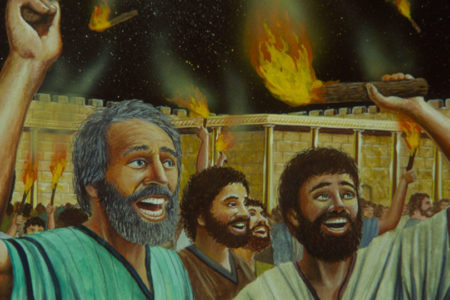Further Evaluation of Christian Reconstructionism
Introduction
The previous article in this series focused on several problems related to the Reconstructionist view of history and eschatology. The present article examines problems related to other areas of Reconstructionism.
The Reconstructionist View of Matthew 24 and the Book of the Revelation
Some Reconstructionists teach that Matthew 24 and the Book of the Revelation are not about the Second Coming of Christ. Instead, they say that they are prophecies about the 70 A.D. destruction of Jerusalem and Israel as a national entity. They teach that the Great Tribulation to which Christ referred in Matthew 24:21 transpired when Israel fell as a nation in 70 A.D. Therefore, the description of “the Son of man coming in the clouds of heaven with power and great glory” (Mt. 24:30) is a reference, not to Christ’s physical return to earth at His Second Coming, but to a coming in divine judgment upon Jerusalem and Israel in 70 A.D. They further contend that the word coming in the Book of the Revelation never refers to the physical return of Christ to earth at His Second Coming. Even Revelation 19 does not present the Second Coming. Instead, it refers to the spread of the gospel throughout the world between the First and Second Comings.
This view has serious problems. First, since the view regards the Great Tribulation as a reference to the fall of Israel as a nation in 70 A.D., and since it considers the coming of the Son of man in the clouds of heaven to be a reference to divine judgment upon Jerusalem and Israel in 70 A.D., then this view appears to consider the coming of the Son of man in Matthew 24:30 to be either equal to, at the same time as, or the cause of the Great Tribulation. But Jesus clearly indicated that the coming of the Son of man in the clouds of heaven would take place “after” the Great Tribulation (Mt. 24:29–30); therefore, it cannot be equal to, at the same time as, or the cause of the Great Tribulation. Thus, if the Great Tribulation transpired when Israel fell as a nation in 70 A.D., then the coming of the Son of man in Matthew 24:30 cannot be a coming in judgment upon Jerusalem and Israel in 70 A.D.
Second, Jesus declared that the Great Tribulation would be an unprecedented time of trouble, unmatched by any time before or after it. With reference to Israel, the Great Tribulation would be the nation’s worst time of trouble. In light of this teaching by Jesus, the Reconstructionist view of the Great Tribulation must conclude that the destruction of Jerusalem and fall of Israel as a nation in 70 A.D. was that nation’s worst time of trouble in all of history.
Is this conclusion valid? Was the 70 A.D. devastation Israel’s worst time in all of history? Josephus, the Jewish historian who wrote an eyewitness account of The Jewish War against Rome, including the horrors of 70 A.D., recorded the number of Jews who died or were captured. According to one scholar, the numbers recorded by Josephus were 1,356,460 Jews killed throughout the war and 101,700 taken prisoner.1 Indeed, this was a terrible time for Israel, but when compared with the Holocaust of World War II, when some 6,000,000 Jews were tortured and killed, the 70 A.D. devastation was not Israel’s worst time in history.
In addition, passages such as Joel 3, Zechariah 12:14, and Revelation 16 indicate that Israel’s worst time will take place immediately before Christ’s physical return to earth at His Second Coming. At that time the armies of all the nations of the world will gather against Israel and Jerusalem (by contrast, only the legions of Rome were gathered against Israel and Jerusalem in 70 A.D.). This future time of trouble for Israel will be so terrible that two-thirds of the Jews will perish (Zech. 13:8–9).
Third, the assertion that Revelation 19 is referring not to Christ’s Second Coming but to the spread of the gospel throughout the world has a problem. The spread of the gospel brings the blessing of God to people; by contrast, the people in Revelation 19 receive the opposite of God’s blessing. Revelation 19 records a judgment scene in which Christ, not as the redemption Lamb (Rev. 5:6–9) but as commander of the armies of heaven and judge, wars against the people with “the fierceness and wrath of Almighty God” (vv. 11, 14–15). The result portrayed is not the salvation of people but the slaying of great masses and the devouring of their dead carcasses by flesh-eating fowl (vv. 17–18, 21). This portrayal corresponds precisely to those of Joel 3:12–17 and Zechariah 12:1–10 and 14:1–15, both of which refer to Christ’s physical return to earth at His Second Coming to war against great masses of people and to dwell in Jerusalem.
The Reconstructionist View of the 70 Weeks of Daniel 9
Reconstructionists claim that all 70 weeks of Daniel 9 were completed by 70 A.D. There is a problem with this view. Daniel 9:25 indicates two significant things. First, the 70-week prophecy concerns Daniel’s people and holy city; therefore, it applies completely to Israel and Jerusalem. Second, all 70 weeks are necessary to accomplish six things with regard to Israel and Jerusalem. In other words, the 70 weeks cannot be completed until all six things have been accomplished with that nation and its holy city.
One of those six things is “to finish the transgression” (v. 24). The word translated “transgression” has the root meaning to rebel.2 With the word “the” before it, it refers to the Jews’ specific sin of rebellion against the rule of God. Thus, in this Daniel 9 prophecy God revealed the fact that the 70 weeks could not be completed until Israel as a nation stops its rebellion against God.
It is a fact that Israel as a nation is still in rebellion against God. Other Scriptures indicate that Israel will not repent of its rebellion, turn to God, and be saved until the Second Coming of Christ (Zech. 12:10–13:1; Rom. 11:25–27). Since God revealed that the 70 weeks could not be completed until Israel as a nation stops its rebellion against Him, and since that rebellion continues, it can be concluded that the 70 weeks of Daniel 9 have not yet been completed.
The Reconstructionist View of Israel as a Nation
Reconstructionists teach that God has permanently excommunicated the nation of Israel from its covenant position because of its persistent breaking of the Mosaic Law and rejection of Jesus Christ as God’s Messiah-Redeemer. As a result of that excommunication, God has no special program for Israel as a nation in the future. God has replaced Israel with a new group, the Church, as His covenant people.
By way of contrast with this view, several significant things should be noted relative to the Abrahamic Covenant. First, God established that covenant with Abraham and his physical descendants—Isaac, Jacob, and the people of Israel—and He made it an everlasting covenant with Abraham and those physical descendants. God declared to Abraham, “I will establish my covenant between me and thee and thy seed after thee in their generations for an everlasting covenant” (Gen. 17:7). Concerning Abraham’s son, Isaac, God promised, “I will establish my covenant with him for an everlasting covenant, and with his seed after him” (Gen. 17:19). God reestablished the promises of the covenant with Abraham’s physical grandson, Jacob (Gen. 28:13–17; 35:9–12; 48:3–4). The instructions that Joseph, Abraham’s great-grandson, gave at the end of his life clearly indicate that he understood the Abrahamic Covenant to have been made with Abraham and his physical descendants (Gen. 50:24–25).
Second, in the Abrahamic Covenant God made national promises concerning Israel. He promised to make a great nation of Abraham’s physical descendants through Isaac and Jacob (Gen. 12:2) and to give the land of Canaan, from the river of Egypt to the river Euphrates, to those physical descendants forever (12:7; 13:14–15; 15:18–21; 17:8).
Third, even after the nation of Israel had sinned in numerous ways over the course of several centuries, David considered the Abrahamic Covenant to be in effect with Israel in his day. David exhorted the Jews, “Be ye mindful always of his covenant; the word which he commanded to a thousand generations, Even of the covenant which he made with Abraham, and of his oath unto Isaac, And hath confirmed the same to Jacob for a law, and to Israel for an everlasting covenant” (1 Chr. 16:15–17; cp. Ps. 105:8–10).
Why would David exhort the Israelites of his day to be mindful of the Abrahamic Covenant if it were no longer in effect because of the nation’s numerous sins? Why would he exhort the Israelites to remember the covenant always if, at any point in history, that covenant could be annulled with them?
Fourth, Moses promised that even though Israel would become idolatrous and evil and would be scattered and suffer because of its sin, in the latter days it would have opportunity to return to God and be obedient because God would not fail Israel, nor destroy it, nor forget the Abrahamic Covenant that He swore to their fathers (Dt. 4:25–31). Several things should be noted concerning this promise. First, it is the same people (literal Israel, the physical descendants of Abraham) who would depart from God and be scattered from the land of Canaan (v. 27) who would also have the opportunity to return to Him and be obedient in the latter days. This implies that the literal nation of Israel will still exist and that God will have a program for that nation in the latter days. Second, the Abrahamic Covenant would still be in effect with the literal nation of Israel in the latter days, in spite of its idolatry, evil, and traumatic history of dispersion and suffering. Certainly that could not be true if the continuation of that covenant with Israel depended upon the faithfulness or obedience of that nation. Third, Moses made it clear (v. 31) that this promise in Deuteronomy 4 would continue to be in effect because of God’s faithfulness. Even though Israel would fail Him, He would not fail Israel. He would be faithful to His covenant commitment to Abraham, Isaac, and Jacob.
Fifth, even after Israel had compiled its sordid record of sin throughout the centuries of Old Testament history, the Holy Spirit indicated that the Abrahamic Covenant was still in effect with that nation and had something to do with Israel’s deliverance from its enemies. Shortly before Jesus’ birth, the Holy Spirit prophesied through the Jewish priest Zacharias,
Blessed be the Lord God of Israel; for he hath visited and redeemed his people, And hath raised up an horn of salvation for us in the house of his servant, David … That we should be saved from our enemies, and from the hand of all that hate us; To perform the mercy promised to our fathers, and to remember his holy covenant; The oath which he swore to our father, Abraham, That he would grant unto us that we, being delivered out of the hand of our enemies, might serve him without fear (Lk. 1:68–69, 71–74).
Sixth, even though Israel committed its ultimate sin of rejecting the Son of God, Jesus, as its Messiah, the Apostle Peter still regarded the Jews (even the very Jews who had rejected Christ) as children of the Abrahamic Covenant. Peter said to a crowd in Jerusalem,
Ye men of Israel … The God of Abraham, and of Isaac, and of Jacob, the God of our fathers, hath glorified his Son, Jesus, whom ye delivered up and denied in the presence of Pilate, when he was determined to let him go. But ye denied the Holy One and the Just, and desired a murderer to be granted unto you; And killed the Prince of life, whom God hath raised from the dead, of which we are witnesses (Acts 3:12–15).
Having thereby identified his audience, Peter said to them,
Ye are the sons of the prophets, and of the covenant which God made with our fathers, saying unto Abraham, And in thy seed shall all the kindreds of the earth be blessed. Unto you first God, having raised up his Son, Jesus, sent him to bless you, in turning away every one of you from his iniquities (Acts 3:25–26).
Peter’s use of the present tense (“are the sons”) indicates his conviction that these Jews were still sons of the Abrahamic Covenant and that the covenant was still in effect with literal Israel, in spite of its rejection of Christ. This corresponds to Moses’ teaching that the covenant would continue to be in effect with literal Israel because of God’s faithfulness to His covenant commitment, not because of that nation’s obedience (Dt. 4:31)
Seventh, in the Epistle to the Hebrews, God doubly emphasized that the Abrahamic Covenant was His unchangeable purpose and therefore was still to be a source of encouragement to Jews who were living when that epistle was written. Hebrews 6:13–14, 16–18 states,
For when God made promise to Abraham, because he could swear by no greater, he swore by himself, Saying, Surely, blessing I will bless thee, and multiplying I will multiply thee … For men verily swear by the greater, and an oath for confirmation is to them an end of all strife. Wherein God, willing more abundantly to show unto the heirs of promise the immutability of his counsel, confirmed it by an oath, That by two immutable things, in which it was impossible for God to lie, we might have a strong consolation, who have fled for refuge to lay hold upon the hope set before us.
Two things should be noted concerning this statement. First, God wanted to impress Abraham and his descendants with the fact that He is absolutely determined to fulfill the Abrahamic Covenant and that fulfillment of the covenant depends totally upon God’s faithfulness to His Word. Second, the Abrahamic Covenant was still to be a source of encouragement to Jews living when Hebrews was written (during the 60s A.D.), in spite of the fact that Israel had rejected Christ several decades earlier.
Eighth, in Romans 11 Paul taught that even in his day (after Israel’s rejection of Christ and while they were enemies of the gospel) the people of Israel had not been cast away by God. They were still beloved of God in accordance with His sovereign choice of them as His special people (vv. 1–2, 28) and for the sake of their ancestors to whom God swore the Abrahamic Covenant (v. 28). Paul’s statements indicate that if God were to excommunicate literal Israel, He would thereby violate His own sovereign choice and betray Abraham, Isaac, and Jacob. In light of this, Paul declared that God’s calling of Israel to be His special people is irrevocable (v. 29).
The Scriptures not only teach that the literal nation of Israel is locked permanently into its covenant relationship with God, but they also indicate that God has a determined, unchangeable future program for that nation. God established another covenant (the Palestinian or Deuteronomic Covenant) with the literal nation of Israel after the establishment of the Mosaic Law Covenant, while the nation was in Moab at the end of its 40 years of wilderness wandering and just a short time before it was to invade Canaan (Dt. 29:1–8).
In preparation for the establishment of the Palestinian Covenant, God promised that if Israel obeyed the Mosaic Law, He would bless it abundantly and make it the head nation (Dt. 28:1–14), but if Israel disobeyed the Mosaic Law, He would curse the nation abundantly with such things as drought, famine, pestilence, foreign oppression, captivity, and worldwide dispersion (28:15–68).
In conjunction with the establishment of the Palestinian Covenant, God made very significant promises to the nation of Israel (Dt. 30:1–10). Moses indicated that these promises will be fulfilled when all the blessings and curses of Deuteronomy 28 have been fulfilled and when Israel genuinely returns to God and obeys Him (vv. 1–2, 8). God promised to gather the scattered Israelites from all over the world (vv. 3–4), to restore them to the land of their ancestors (v. 5), to regenerate the Israelites of that time plus all their descendants and thereby cause them to love Him totally (v. 6), to judge Israel’s enemies (v. 7), and to prosper Israel greatly (v. 9).
Centuries after God made these promises of the Palestinian Covenant to Israel, He repeated and expanded them to later generations of Israelites through the prophets, as evidenced by the following passages: Isaiah 2:1–4; 4:2–6; 9:1–7; 11; 12; 14:32; 19:22–25; 26; 27:6–13; 32:1–8; 35; 40; 41; 43:1–44:5; 49:22–23; 51; 52:1–12; 54; 55; 59:15–21; 60–62; 65:8–10, 17–25; 66:7–14, 20–22; Jeremiah 3:11–18; 16:14–15; 23:5–8; 30; 31; 32:36–44; 33:14–26; Ezekiel 11:14–21; 16:60–63; 20:33–44; 28:25–26; 34:23–30; 36:8–15, 22–38; 37:11–28; 39:25–29; 40–48; Hosea 1:10–2:1; 2:14–23; 3:5; 11:8–11; 14:4–7; Joel 2:18–3:21; Amos 9:11–15; Obadiah 17–21; Micah 2:12–13; 4:1–8; 5:2–15; 7:14–20; Zephaniah 3:9–20, Haggai 2:6–9, 21–23; Zechariah 1:13–17; 2:4–13; 3:8–10; 6:12–13; 8:2–8, 11–15, 20–23; 9:10–10:12; 12:1–13:2, 9; 14.
Several significant things should be noted concerning the promises of the Palestinian Covenant. First, God made these promises to the literal nation of Israel, the same national group that He later banished through dispersion to other nations because of disobedience to Him (Dt. 28:15–68; 29:10, 24–29, 30:1, 3). Thus, these promises are to be fulfilled with literal Israel.
Second, these promises indicate that God always leaves the way open for unfaithful Israel to be reconciled to Him (cp. Ezek. 16). God never has terminated and never will permanently terminate His special relationship with literal Israel. In line with this, David said the following to God concerning the nation that He had brought out of Egypt: “For thou hast confirmed to thyself thy people, Israel, to be a people unto thee forever” (2 Sam. 7:24).
Third, the ultimate fulfillment of these promises with Israel is still future. Moses indicated that fulfillment will not take place until all the curses of Deuteronomy 28 have been completed and Israel has genuinely returned to God and obeyed Him (Dt. 30:1–3). Literal Israel has not yet returned to God and is not now obeying Him, and it is evident from the anti-Semitism of the 20th century that the curses of Deuteronomy 28 have not yet been completed for Israel.
In light of all that has been seen, two things can be concluded concerning the literal nation of Israel. First, God has not excommunicated it from its covenant position with Him. Second, God does have a special program for Israel as a nation in the future.
The next article in this series will examine problems related to other areas of Reconstructionism.
ENDNOTE
- Henry Hart Milman, The History of the Jews, Vol. 2, 388; quoted by Philip Schaff, History of the Christian Church, Vol. 1 (Grand Rapids, MI: Wm. B. Eerdmans Publishing Company, 1975), 400, footnote 2.
- H. C. Leupold, Exposition of Daniel (Grand Rapids, MI: Baker Book House, 1949), 412.








Israel still has a future role to play in God’s economy. Isaiah 27:6 and 54:1-3 in conjunction with Joel 2:28, 29 indicate Israel will deliver the gospel to the Gentile nations during the millennial kingdom. If as the Christian reconstructionists say, Israel has been excommunicated then God has broken His word and He would thus have to rewrite what He spoke through the prophets. Yet in John 10:35 Jesus spoke these words, “Scripture cannot be broken.” Reconstructionists simply don’t accept, believe and trust Scripture and because they don’t they’re calling God a liar, 1 John 5:10